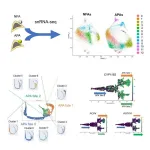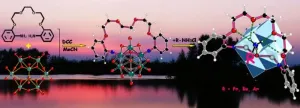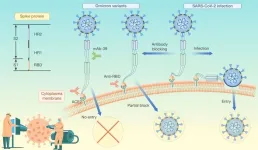(Press-News.org) Saint Louis University associate professor of health management and policy in the College for Public Health and Social Justice, SangNam Ahn, Ph.D., recently published a paper in Journal of Clinical Psychology that examines the relationship between childhood adversity, and psychiatric decline as well as adult adversity and psychiatric and cognitive decline. His team discovered that just one instance of adversity in childhood can increase cases of mental illness later in life, and adverse events in adults can lead to a greater chance of both mental illness and cognitive decline later in life.
“Life is very complicated, very dynamic,” Ahn said. “I really wanted to highlight the importance of looking into the lasting health effect of adversity, not only childhood but also adulthood adversity on health outcomes, especially physical health and psychiatric and cognitive health. There have been other studies before, but this is one of the first that looks into these issues comprehensively.”
Ahn, along with his team of researchers, examined data from more nearly 3500 individuals over the course of 24 years. The group took the longitudinal data and evaluated it using a list of lifetime potential traumatic events.
The research team included childhood adversity events such as moving due to financial difficulties, family requiring financial help, a parent experiencing unemployment, trouble with law enforcement before the age of 18, repeating school, physical abuse and parental abuse of drugs or alcohol. Adulthood adversity events included the death of a child, the death of a spouse, experiencing a natural disaster after age 17, firing a weapon in combat, a partner abusing drugs or alcohol, being a victim of a physical attack after age 17, a spouse or child battling a serious illness, receiving Medicaid or food stamps and experiencing unemployment.
The study determined that nearly 40 percent of all individuals experienced a form of childhood adversity, while that number climbed to nearly 80 percent for adulthood adversity. Those who experienced childhood adversity were also 17 percent more likely to experience adulthood adversity. Only 13 percent of individuals sampled reported two or more forms of childhood adversity, while 52 percent of adults experienced two or more forms of adult adversity.
In cases of either childhood adversity or adulthood adversity, researchers found individuals who experienced adversity were also more likely to experience anxiety and depression later in life, and in the case of adulthood adversity, were also more likely to experience cognitive decline later in life.
Individuals with one childhood adversity experience saw a five percent higher chance of suffering from anxiety, and those with two or more childhood adversity experiences had 26 percent and 10 percent higher chances of depression and anxiety, respectively. Individuals who experienced two adulthood adversities had a 24 percent higher chance of depression, while also experiencing a three percent cognitive decline later in life.
While most of the results were expected or unsurprising, one area that stood out to Ahn was education. Those individuals studied who reported higher levels of education saw a reduction in the number of adversity experiences. Ahn hopes to study this avenue more to learn how education may be able to mitigate or prevent these declines.
“Before including education, there was a significant association between childhood adversity and cognitive impairment,” Ahn said. “But when including education as a covariate, that significant association disappeared. Interesting. So there were important implications here. Education and attending school, people could be better off even if they were exposed to childhood adversity. They're likely to learn positive coping mechanisms, which may help avoid relying on unhealthy coping mechanisms, such as smoking or excessive drinking or drug use.
“Education is quite important in terms of health outcomes,” Ahn added. “If I am educated, I'm likely to get a better job, have a higher income, and live in areas with less crime. I'm likely to buy gym membership or regularly exercise. I'm likely to shop at Whole Foods and get proper nutrition. All of which help combat these adversities we hinted at in the study. So the education and health outcomes are already closely related, and that is what we saw in our study.”
Ahn also encourages clinicians and everyday people alike to discuss their stress. Clinicians can learn more about their patients and have a better approach when it comes to their physical and mental health, while others could potentially relate to shared experiences. But through awareness and recognition, these adverse experiences could potentially have less serious, lasting effects.
“Public health is very interested in stress,” Ahn said. “But we’re still examining how daily stress impacts our long term health outcomes. So to see the effects here in the study, I want people to pay attention to their stress and proactively address it. Clinicians should have deep discussions with their patients about their stress and mental state. And those topics can be approached in other areas too, like the classroom or the dining room table. The more we are aware of stress and discuss our stress, the better we can handle any adversities we find in life.”
END
SLU professor studies link between adversity, psychiatric and cognitive decline
2024-03-01
ELSE PRESS RELEASES FROM THIS DATE:
Warwick to benefit from £2.5 million funding into “phenomenal” metamaterials
2024-03-01
A £2.5m grant will enable a new network driving research into metamaterials, headed up by a researcher from the University of Warwick.
Metamaterials have phenomenal potential. They are artificial 3D structures comprised of at least two different materials. This combination and the structure give metamaterials properties beyond those of the materials used to make them. These properties may be electromagnetic, acoustic, magnetic, mechanical/structural, thermal, or chemical.
Metamaterials could transform our economy in a digital age, helping to address society’s challenges by contributing to manufacturing in areas of sustainability, health care, ...
More schooling is linked to slowed aging and increased longevity
2024-03-01
Participants in the Framingham Heart Study who achieved higher levels of education tended to age more slowly and went on to live longer lives as compared to those who did not achieve upward educational mobility, according to a new study at Columbia University Mailman School of Public Health and The Robert N. Butler Columbia Aging Center. Upward educational mobility was significantly associated with a slower pace of aging and lower risk of death. The results are published online in JAMA Network Open.
The Framingham Heart Study is an ongoing observational study first initiated in 1948 that currently spans three generations.
The Columbia analysis is ...
Trends in recurring and chronic food insecurity among US families with older adults
2024-03-01
About The Study: The results of this study highlight how rates of recurring and chronic food insecurity among families with older adults rose substantially over the past 20 years. Monitoring national trends in food insecurity among older adults has direct programmatic and policy implications.
Authors: Cindy W. Leung, Sc.D., M.P.H., of the Harvard T.H. Chan School of Public Health in Boston, is the corresponding author.
To access the embargoed study: Visit our For The Media website at this link https://media.jamanetwork.com/
(doi:10.1001/jamahealthforum.2023.5463)
Editor’s ...
Self-reported everyday functioning after COVID-19 infection
2024-03-01
About The Study: The findings of this study of 372 veterans suggest that the negative impacts of the COVID-19 pandemic on everyday function may occur via multiple pathways regardless of whether or not they had a documented infection with COVID-19. Future work with larger samples is needed to validate the estimated associations.
Authors: Theodore J. Iwashyna, M.D., Ph.D., of Ann Arbor VA in Ann Arbor, Michigan, is the corresponding author.
To access the embargoed study: Visit our For The Media website at this link https://media.jamanetwork.com/
(doi:10.1001/jamanetworkopen.2024.0869)
Editor’s ...
The surprisingly complex inner workings of an endocrine tumor
2024-03-01
Researchers from Tokyo Medical and Dental University (TMDU) find that the cells that make up aldosterone-producing adenomas become more transcriptionally active and express higher levels of genes linked to hormone production over intratumoral differentiation.
Tokyo, Japan – There is strength in teamwork, and it turns out that this applies to tumors, too. Researchers from Japan have reported that different types of cells within a single benign tumor may work together to promote the tumor’s growth.
In a study published this ...
Safety assessments for older drivers would benefit from introducing spatial orientation tests
2024-03-01
Older drivers who have worse spatial orientation ability experience greater difficulty when making turns across oncoming traffic, according to new research from the University of East Anglia (UEA).
Spatial orientation skills are the combination of skills that enable us to mentally determine our position, or the position of our vehicle and other vehicles, relative to the environment.
Lead author Sol Morrissey, a PhD researcher at UEA’s Norwich Medical School, said: “Driving safety is typically reduced in older adults due to changes that take place during ...
New type of metallacrown ether, polyoxometalatocrown ether, opens research opportunities
2024-03-01
Crown ethers were discovered in 1967. They were then modified by adding a metal-containing unit creating metallacrown ethers. These metallacrown ethers have been the subject of intensive research. Depending on the molecular makeup of the metallacrown ethers and their resultant architecture, the properties and therefore the uses of the metallacrowns can change. They have many different uses currently, and ongoing studies continue to expand their application. Just a few of these include magnetic refrigeration, imaging agents—specifically as potential contrast agents in magnetic resonance imaging—and single-molecular ...
A protective human monoclonal antibody targeting a conserved site of spike glycoprotein of SARS-CoV-2 Omicron variants
2024-03-01
The ongoing COVID-19 pandemic caused by SARS-CoV-2 has caused serious damage to public health and the global economy, and one strategy to combat COVID-19 has been the development of broadly neutralizing antibodies for prophylactic and therapeutic use. The most emergency-use authorized (EUA) therapeutic monoclonal antibodies, are more likely to lose their neutralizing activities as the viral epitopes (e.g. the receptor-binding domain, RBD) within spike protein of SARS-CoV-2 they target are more prone to mutate. By contrast, the S2 subunit of spike protein, has a much lower frequency of mutation than ...
Scientists reveal how our cells’ leaky batteries are making us sick
2024-03-01
Researchers have discovered how “leaky” mitochondria – the powerhouses of our cells – can drive harmful inflammation responsible for diseases such as lupus and rheumatoid arthritis. Scientists may be able to leverage the findings to develop better treatments for those diseases, improve our ability to fight off viruses and even slow aging.
The new discovery reveals how genetic material can escape from our cellular batteries, known as mitochondria, and prompt the body to launch a damaging immune response. By developing therapies to target this process, doctors may one day be able to stop the harmful inflammation ...
Ultraviolet radiation from massive stars shapes planetary systems
2024-03-01
To find out how planetary systems such as our Solar System form, an international research team including scientists from the University of Cologne studied a stellar nursery, the Orion Nebula, using the James Webb Space Telescope (JWST). By observing a protoplanetary disc named d203-506, they discovered the key role massive stars play in the formation of planetary systems that are less than a million years old. The study, led by Dr Olivier Berné from the National Centre for Scientific Research (CNRS) ...




